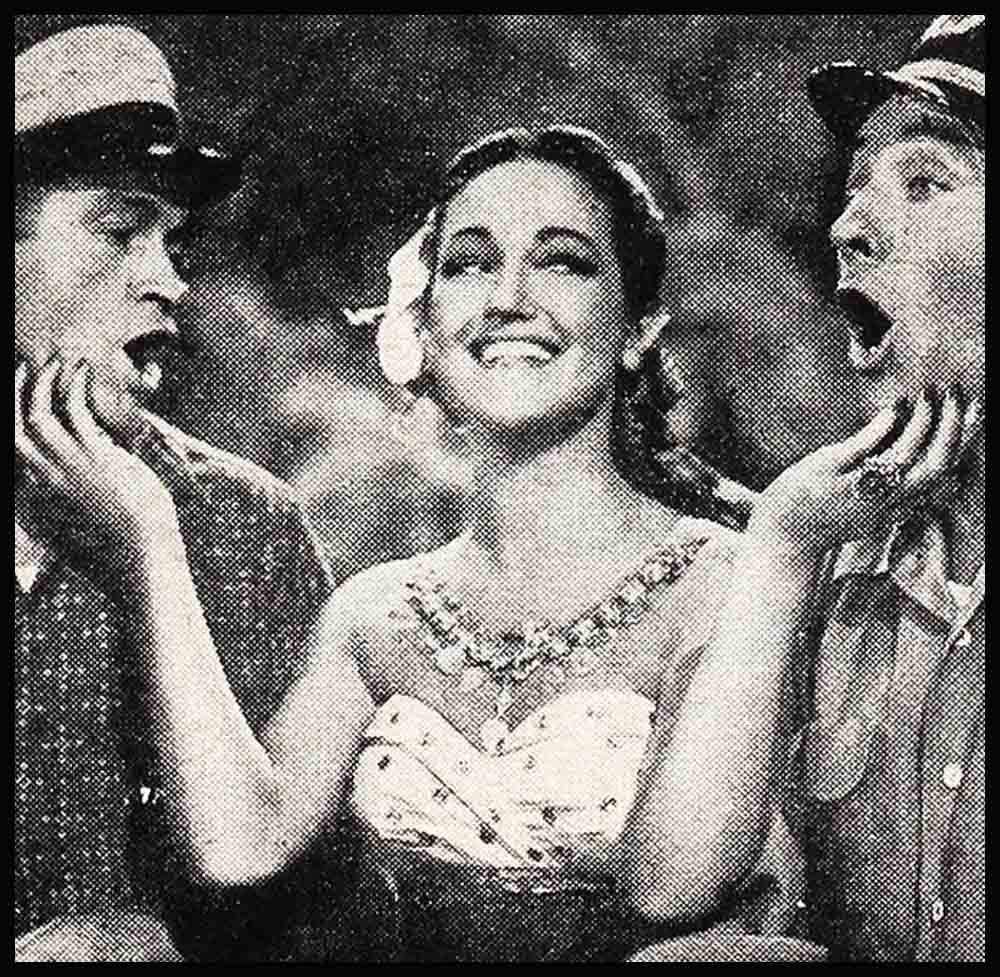
Go Out To A Movie

The British are ahead of us in jet travel, so it’s appropriate that they should come through with this soaring human adventure story of the first, man-killing attempts to fly faster than the speed of sound. Air scenes are superbly realized, making you feel the flyer’s terror and exhilaration. The plot reminds you of many other movies about women married to men who ply dangerous trades. But its people are believable, consistent, beautifully acted: the girl (Ann Todd) who can’t understand why her husband must fly jets and why her father, the manufacturer, must send men to possible death; the lonely father (Ralph Richardson); the first test pilot (Nigel Patrick), the unthinkingly brave sort who “flies by the seat of his pants”; the successful pilot (John Justin); his gallant wife (Dinah Sheridan).
Verdict: Tense, enthralling tribute to pioneers of today
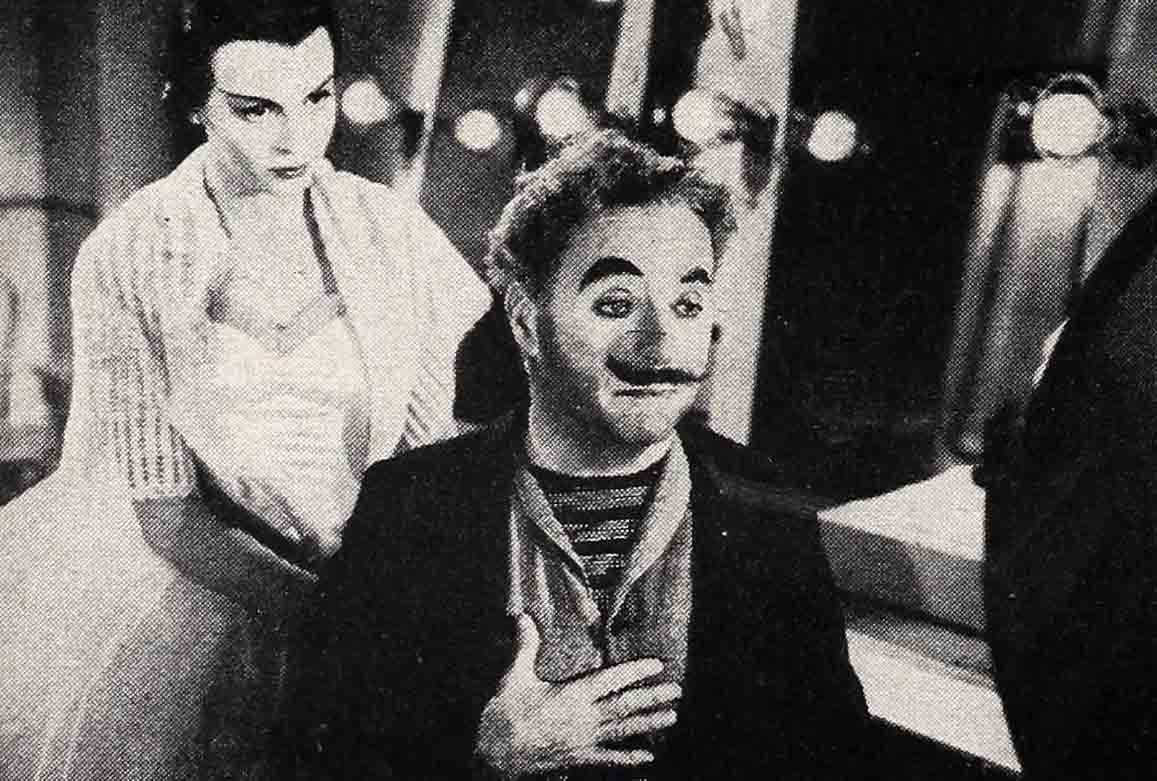
Limelight
If you can bring to watching this movie the same affection that its maker did to producing it, you’ll find it an enchanting experience. Charlie Chaplin is looking back to his old world of the London music hail, and he’s imagining—“There but for the grace of God go I”—what he might feel if his life had turned toward failure instead of Hollywood and international fame. No longer the little tramp, he’s a forgotten vaudeville star, lost in drink and remembering—until he rescues a disheartened young ballerina from suicide. The exquisite, radiant Claire Bloom helps give life to the tender relationship between this oddly matched pair. Sydney Chaplin is nicely serious as the composer who also loves the ballerina, and nobody but Buster Keaton could have kept pace with Chaplin in a wonderful slapstick bit.
Verdict: Intensely personal, slow but savorsome

The Bad and the Beautiful
It takes a sharp interest in movie-making to appreciate this inside view of Hollywood. Kirk Douglas is the Central, controversial figure, a producer whose co-workers wind up hating him—but can’t escape his compelling influence. Barry Sullivan, ambitious young director, helps Kirk get his start, then is callously brushed aside. Lana Turner, spiritless drifter, daughter of a famous actor, is pushed into stardom with a romance that’s brutally brief. Dick Powell, a novelist imported to Hollywood, also falls under Kirk’s spell, and the writer’s marriage to a Southern belle (neatly caricatured by Gloria Grahame) is sacrified to the producer’s mania for creating good movies. Lana shows fine emotional fire, but Kirk has trouble making a cryptic character sympathetic, in spite of the switcheroo designed to do the trick.
Verdict: Fascinating close-up of Hollywood intrigues
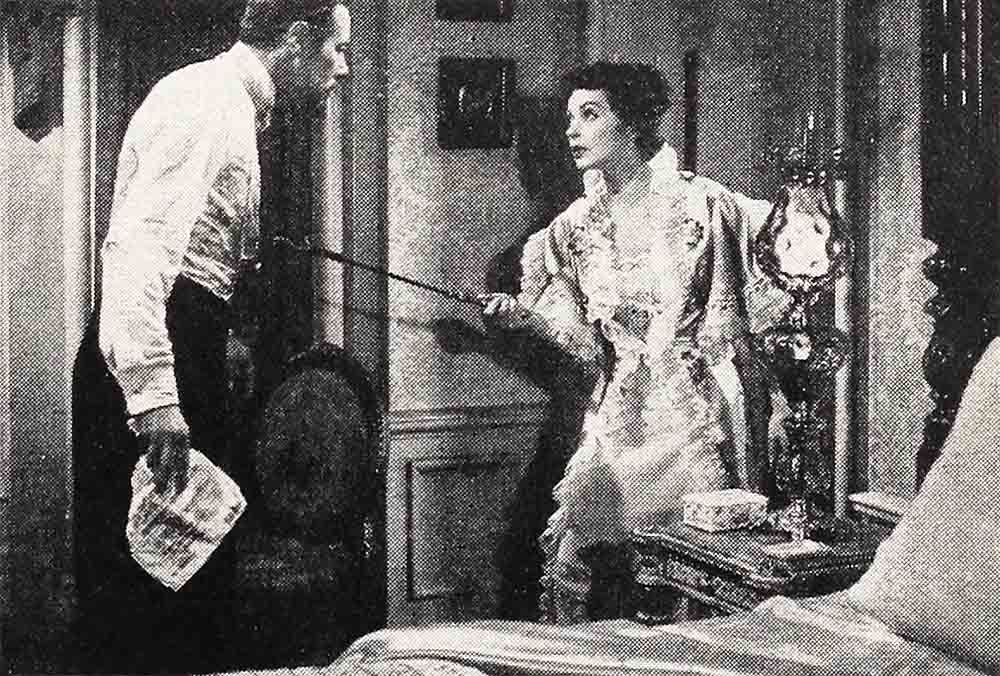
The Four Poster
A cast that’s limited to two people and sets that confine them to their own apartment may not seem a formula for a distinguished movie. But the device creates an atmosphere of special intimacy, with Rex Harrison and Lilli Palmer to tell you the story of a marriage. The picture shifts easily from farce to drama to tragedy to sentimental fantasy. Top plaudits go to Lilli, giving a fluid, brilliant performance as shy bride, wise wife, a bride’s restless mother, serene old lady. Rex is most convincing in comedy scenes, though he makes a full-length figure of the writer whose wife shows him the way to success in writing and living. But you find the cream of the movie in the cartoon “inter-scenes” that fill in bits of plot, bridge the years, suggest the tragedy of war and the hoopla of the jazz age. Each one is richly imaginative.
Verdict: Tender, amusing, too-talky tale of wedded lovers
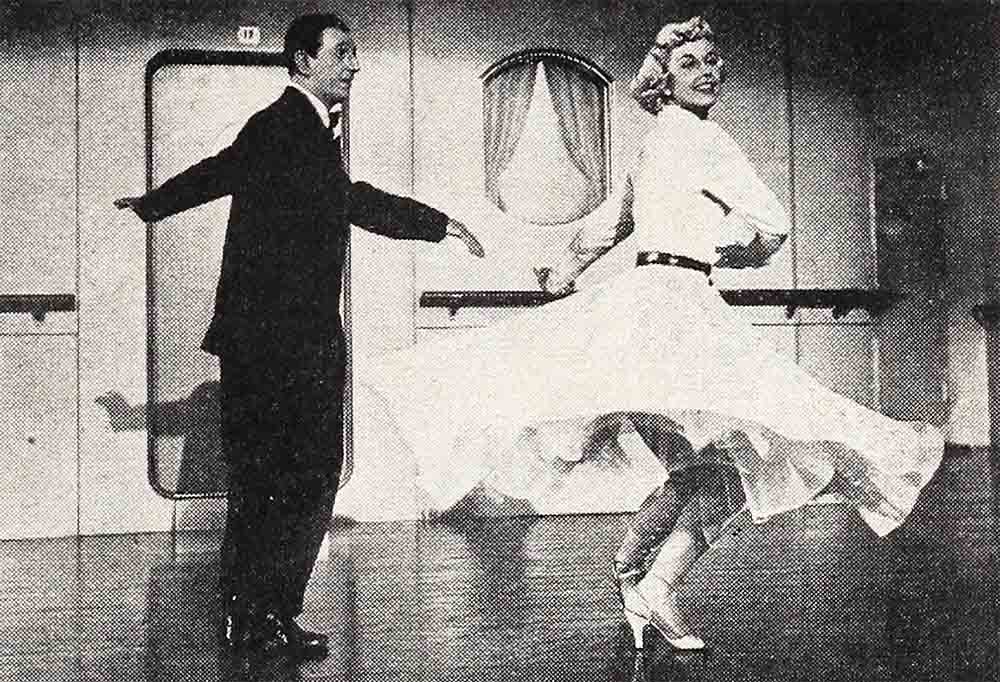
April in Paris
The warm presence and notable musical gifts of Doris Day and Ray Bolger breathe life into a flimsy farce plot, and it’s done so spontaneously that even the waits between numbers are easy to take. Dodo’s a lowly chorine invited by mistake to represent the U. S. at a Paris art festival; Ray’s a State Department underling, a stuffed shirt who gets unstarched on the gay transatlantic trip. Love dawns fast, in shipboard style, and a phony marriage that the Principal parties believe to be real gives rise to a lot of dodging in and out of cabins. The confusion’s straightened out in a Paris that is obviously the “Paree” of the popular legend. Claude Dauphin cooperates amiably as a French entertainer turned waiter in a financial crisis. Liveliest number is a jamboree in the galley, looking pleasantly impromptu, as a good musical routine should.
Verdict: Songs by Day, dances by Ray keep you happy
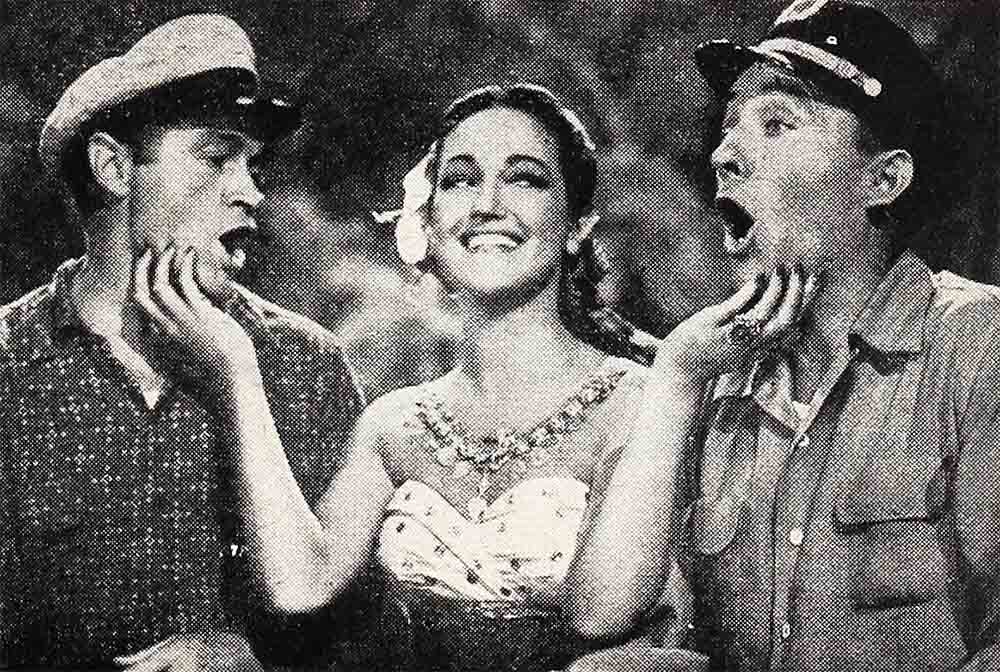
Road to Bali
The first fine bloom of the “Road” series may have worn off, but for aficionados there’s still a relaxing charm about the adventures of Bing, Bob and Dottie. As usual, Crosby, Hope and Lamour give you the impression that they’re making up the plot as they go along. There’s the Standard opening scene with two show-biz fakers judiciously getting out of town—Sydney, Australia, in this case. Before they realize what they’re doing, Bob and Bing are involved in the dangerous business of resurrecting sunken treasure from an octopus-haunted lagoon, at the bidding of native prince Murvyn Vye. Bob remains the hysterical type; Bing, the boy who knows it’s all in fun; Dottie, dutiful straight man (and extracurvy female). And many guest celebs pop up.
Verdict: Casual, comical, musical improvisation
Behind the headlines of trouble flaring in far corners of t he world, family life goes on, and this taut British film takes you into the household of a rubber planter and his wife in uneasy Malaya. Claudette Colbert is so competent as an actress, Jack Hawkins so virile and forthright, that you sympathize with both parties in the crisis. The wife feels that the planter has drifted away from her, absorbed in the battle against murderous natives who threaten the plantations. She and her son (engaging little Peter Asher) are about to go to England when an outburst of violence turns their home into a fortress. The siege builds to a climax that solves the couple’s personal problem.
Verdict: Tense, expert topical drama
Many a good picture has used this reliable theme: The reactions of a group of people come together by chance and isolated in the face of danger. Here, desert thirst and warring Comanches threaten the weary survivors of a cavalry troop, joined by other desert travelers. All eventually make a stand at the only water hole in the region. Outstanding in the capable cast are Broderick Crawford as a tough cavalry sergeant. Barbara Hale as an officer’s sister, Johnny Stewart as a friendly Indian lad, and Chubby Johnson as a cowardly traveling salesman.
Verdict: Vigorous, convincing Western
Long practice has made Hollywood almost as facile with crook pictures as with Westerns, so it’s no surprise to find the inside story of a million-dollar armored-car robbery turned into a neat thriller. John Payne shows a bit more emotion than usual as the innocent deliveryman implicated in the crime. To clear himself, he assumes the identity of one of the bandits, killed by police after the hold-up, and makes his way to the pay-off spot, in Mexico. His deception is possible because the robbery, as planned by ex-cop Preston Foster, was carried out by masked men who didn’t even know each other. It’s a tricky situation, with the romantic touch contributed by Coleen Gray.
Verdict: Brisk, well-photographed melo
The film version of the famous play too often bogs down in talk—though the sparkle and deep meaning of Bernard Shaw’s lines are worth listening to. With his witty portrayal of Caesar, Maurice Evans comes closest to the intended spirit of the picture. Jean Simmons’ Christian maiden is a winning creation, both impish and saintly, but Victor Mature brings little more than suitably classic features to his Roman-soldier role. Alan Young has the hardest assignment, as Androcles, the Christian who befriended a lion. And he carries it off well: gentle and clownish, timid by nature, brave by conviction.
Verdict: Slow-paced, but of some interest
Generally of familiar pattern, this Western ends with an intriguing echo of “The Gunfighter.” Rock Hudson, till now an amiable, hulking kid, shows a commendable increase in composure and maturity as the boy whose fondness for cards and readiness with a gun leads him into trouble. Mary Castle is unhappily cast as the wishy-washy good girl he first loves; Julia Adams gets a better break as the dance-hall gal who accompanies him into outlawry and (belatedly) becomes his wife as he tries to settle down.
Verdict: Pleasing action film of old Texas
It’s possible for a movie to have too powerful a theme. Robert Taylor’s earnest performance as Col. Paul Tibbets, pilot of the plane that dropped the atom bomb on Hiroshima, creates moments of intense personal drama, almost big enough for the theme. But the story’s narrated by Eleanor Parker, as his wife, and this device throws the whole picture out of focus. While Tibbets bears the chief grueling responsibility for preparations and final timing, the project must be kept a secret even from his wife. The marital discord resulting from his unexplained edginess is advanced in plot twists that suggest mistaken-identity farce.
Verdict: Strong story, unevenly treated
We’re out west again, this time sharing the adventures of a group of Confederate soldiers stranded in Nevada Territory at the war’s end. Led by doughty Randolph Scott, they donned civvies to hold up a Union gold train, so now they are accused of banditry and pursued by ruthless vigilantes. Most of the fast, well-planned action takes place in the stagecoach station where the soldiers and four Yankee captives are beleaguered. Donna Reed, as a Union Army nurse, adds a romantic note. Claude Jarman, Jr., is also impressive.
Verdict: Business-like horse opera
This tune-trimmed comedy-drama gets off to an ingratiating start, then slows down and overplays its simple story. As a braggart medicine-show man. Dan Dailey gives a lift to a lad who’s on the lam from a dismal orphanage. Dan’s generosity involves him in crooked small-town politics, and Diana Lynn gets into the act as a member of the orphanage board. Song numbers feature Dan, boy soprano Chet Allen (as the orphan), “Seat Man” Crothers and Carole Matthews.
Verdict: Barber-shop-style nostalgia
Extra background color would have built up the attractions of this unpretentious melodrama. As an innocent fugitive from a political brawl in one of the Central American banana republics, Ronald Reagan arrives in another of these countries in time to help Rhonda Fleming save her plantation. (You’ll recognize the good old Western motif of the girl ranch-owner.) Estelita tosses in Latin rhythms as a cafe singer who’s sweet on Reagan.
Verdict: Bananas sub for cattle herds
Fans probably expect more musical trimmings from an Esther Williams film than they get in this extravaganza. Es is the logical choice to play Annette Kellerman, Australian-born swim champ famous at the beginning of this century. There’s nostalgic charm in the sequences showing Annette as a child (Donna Corcoran) swimming to heal her crippled legs, and the grown-up Annette horrifying prudes with her one-piece bathing suit. But the story falls into the show-business formula. with Victor Mature as the carnival man who can’t stand being overshadowed by his girl.
Verdict: Mild salute to a real-life star
The soldier of the title, typified by Tyrone Power, is none other than your old friend the mountie who always gets his man. Ty plays a new recruit who must prove himself by persuading the wandering Crees to return to their reservation and give up two American hostages they’ve captured. Cameron Mitchell is startlingly cast as a bloodthirsty brave, but Thomas Gomez provides expected comedy relief as Ty’s half-breed guide. The captives are portrayed by pretty Penny Edwards and by Robert Horton, an able young heavy.
Verdict: Stilted but often exciting
Abbott and Costello Meet Captain Kidd
With more song and spectacle than most Abbott-Costello vehicles, the comics’ excursion into the pirate era finds a goodly number of laughs. Charles Laughton, playing Kidd in his fruitiest style, makes an imposing stooge for Bud and Lou, cast as a pair of tavern flunkeys. There’s much nonsense about who’s got the treasure map, which keeps getting mixed up with a mushy love note written by Fran Warren to tavern singer Bill Shirley.
Verdict: Plenty of fun for A & C fans
Howard Keel’s first Hollywood try at a straight dramatic part is unfortunately framed in a strictly gimmick sort of plot. A transport plane has crashed in a Canadian wilderness; aboard it are Keel’s two children. returning to their mother, his first wife; both Keel and his arrogant ex are flyers in the search. Patricia Medina has a hopeless role as the man-eating aviatrix, but the highly talented Jane Greer, as Keel’s second wife, and Keenan Wynn, as his knowing buddy, almost breathe life into the mechanical story. Low point is the wooden depiction of the children.
Verdict: Trick idea that misses fire
As a spectacle, this Italian-made adventure movie is often a treat to see, filled with the ancient grandeur of Venice and great crowds of picturesquely clad extras. As a story, it’s less effective, getting well snarled in fictional intrigues of the Renaissance. The late Maria Montez has the kind of role that won her fame, playing a fiery slum-dweller who helps to free her city from a cruel usurper. Paul Christian plays a Venetian Robin Hood.
Verdict: Slight story in splendid settings
The violence that shook India as British rule drew to a close is much too serious a subject to be used for a routine action yarn. Every nationality concerned is likely to be insulted by the stock types presented here: Americans, by Alan Ladd’s money-grubbing, gun-running flyer, who won’t rescue a group of Europeans until he gets cash on the line; Indians, by Charles Boyer’s gentle Indian leader, who finally discards his Gandhian principles; the French, by Corinne Calvet’s fancy lady; the British, by the Colonel Blimps and their ladies. Deborah Kerr’s blind heroine is a queasily sentimental creation.
Verdict: Shallow and tasteless
It is a quote. PHOTOPLAY MAGAZINE FEBRUARY 1953




